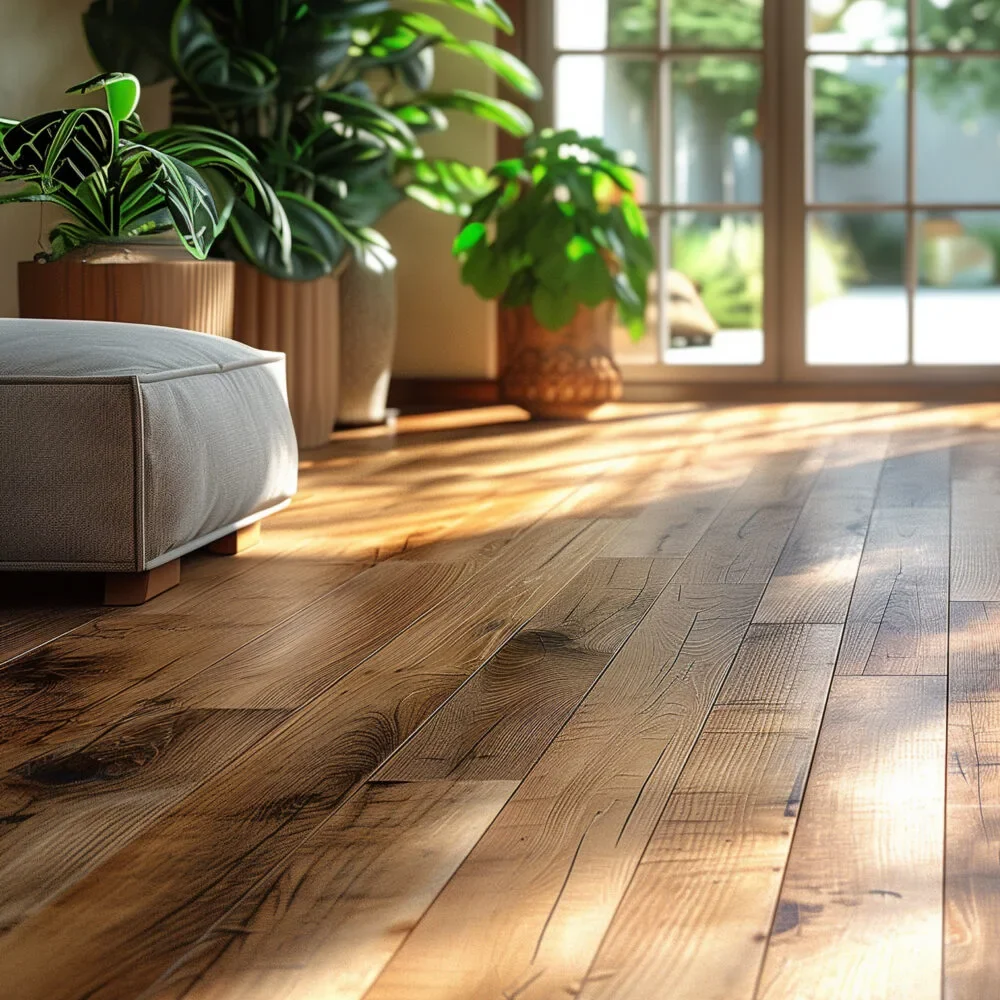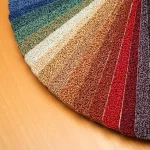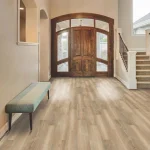- November 22, 2024
Selecting the right flooring for your basement is crucial for durability and functionality. Basements often face unique challenges such as moisture, flooding, and poor insulation. So, you must choose materials that can withstand these conditions.
Excess moisture can damage certain floor types, while temperature fluctuations may affect others. The basement’s usage plays a key role in deciding the best flooring. Whether it’s a laundry room, home gym, or living space, the type of flooring will vary based on the function.
Homeowners have a variety of options depending on their needs and budgets. Vinyl and tile are popular choices due to their water resistance and affordability. Epoxy coatings are ideal for protecting unfinished basements. Engineered wood and laminate offer a more attractive finish for low-moisture areas. Each option has its own set of pros and cons. Therefore, evaluate the specific conditions of your basement before selecting a material.
This guide will walk you through the best flooring choices based on moisture resistance, durability, and cost. It aims to help you make an informed decision.
Key Factors to Consider Before Choosing Basement Flooring
When selecting basement flooring, several crucial factors must be taken into account.
- First and foremost, moisture and water resistance are critical considerations. Basements are naturally more prone to dampness. It can lead to mold and mildew if water-resistant materials are not chosen. Therefore, opt for flooring that can withstand moisture, such as vinyl or tile.
- Alongside material selection, proper subfloor preparation is vital. It includes installing effective moisture barriers. Also, ensure the subfloor is level. A level subfloor provides a stable base for the flooring. It helps prevent issues like warping or cracking over time.
- The intended use of the basement significantly influences the flooring choice as well. For example, a living area may require warmer flooring options. Softer materials like carpet or luxury vinyl are ideal choices. In contrast, a home gym might benefit from more durable materials. Shock-absorbent options, such as rubber or vinyl, are great for this type of space. If the basement is primarily a storage space, water resistance remains crucial. However, aesthetics may be less of a concern in that scenario.
- Budget considerations are also important, as flooring costs vary widely. Popular choices like tile, vinyl, and carpet come in various price ranges. This variety allows homeowners to select materials that fit their financial constraints. At the same time, these options can still meet functional needs.
- Finally, assessing durability and long-term maintenance requirements is essential, especially for high-traffic areas. Flooring that can endure wear and tear requires minimal upkeep. It will save time and money.
Common Basement Flooring Options
When choosing flooring for a basement, homeowners have a variety of options. Each type of flooring offers distinct benefits and drawbacks.
1. Luxury Vinyl Plank (LVP) and Vinyl Sheet
Luxury Vinyl Plank (LVP) and vinyl sheets are popular basement flooring options. They are water-resistant, easy to install, and affordable. These materials are especially suitable for finished basements that are prone to moisture. They help prevent damage while providing a stylish look.
Vinyl options come in a variety of designs. They can mimic the textures of wood and stone. It allows homeowners to achieve the aesthetic they desire. It can be done without the high costs associated with natural materials.
One of the key advantages of LVP and vinyl sheets is their ease of cleaning. They are practical for spaces that may experience spills or heavy foot traffic. However, note that these flooring options may show wear over time. This is particularly true in high-traffic areas. Overall, LVP and vinyl sheets offer a compelling blend of functionality and style.
2. Ceramic and Porcelain Tile
Ceramic and porcelain tiles are excellent options for basement flooring. They are particularly effective in wet conditions. Both materials are inherently durable and moisture-resistant. They are ideal for environments where water exposure is a concern. Their robust nature ensures they can withstand heavy foot traffic.
Additionally, their easy-to-clean surfaces allow for hassle-free maintenance. It is an important feature for busy households. One significant advantage of tile flooring is its longevity. When properly installed, it can last for many years without significant wear.
However, note that installing ceramic or porcelain tile requires an underlayment. This underlayment provides insulation. It can add to the overall project cost and complexity. The underlayment is essential for providing a comfortable temperature. It also helps reduce noise. Ceramic or porcelain tile works especially well in basements that may be colder than other parts of the home.
3. Carpet
Carpet adds warmth and comfort to cold spaces. However, careful moisture management is essential to prevent issues associated with dampness. When considering carpet, homeowners can choose between carpet tiles and traditional rolls. Carpet tiles offer flexibility. They allow for easier installation and replacement of individual sections. This is particularly beneficial if sections become damaged or stained. They are also available in various styles and colors, making it easy to create a customized look.
On the other hand, traditional roll carpets may provide a seamless appearance. However, they can be more challenging to install and maintain. Most modern carpets are made from synthetic materials. These materials resist staining and fading making carpets suitable for high-traffic areas. Despite their benefits, carpets can attract mold and mildew in damp areas. It poses a challenge for basements.
4. Engineered Hardwood
Engineered hardwood offers a balance between aesthetics and functionality. Compared to traditional hardwood, engineered hardwood is more resilient in humid environments. It’s a better choice for below-grade spaces. However, it remains vulnerable to moisture, so proper precautions are essential.
One of the primary advantages of engineered hardwood is its elegant appearance. This feature adds warmth and sophistication to any basement setting. Its layered construction helps it withstand changes in temperature and humidity. This makes it more resilient than solid hardwood and reduces the risk of warping.
Nevertheless, you must install a high-quality moisture barrier beneath the flooring. It protects from potential moisture damage. This additional step is crucial. It ensures the longevity of the material and maintains its visual appeal.
5. Rubber Flooring
Rubber flooring is excellent in home gyms or play areas. Its shock-absorbent properties make it ideal for spaces where physical activities take place. It provides cushioning that reduces the impact on joints during exercise. This feature is especially beneficial in environments where children are playing. It helps prevent injuries from falls.
Also, rubber flooring is water-resistant. It is suitable for basements that may experience moisture issues. This resistance protects the flooring from damage and helps maintain a hygienic environment. It can be easily wiped down or cleaned with minimal effort.
The durability of rubber flooring is another significant advantage. It withstands heavy use without showing signs of wear and tear. Rubber flooring is available in various colors and styles. It can complement any basement design while providing practical benefits.
Unconventional Flooring Options
Unconventional flooring options can add a unique touch to your basement. They offer a blend of creativity and functionality.
- One such option is cork flooring. It is eco-friendly, soft underfoot, and provides natural insulation against cold temperatures. Cork is also water-resistant, making it suitable for basements with minor moisture concerns. However, proper sealing is required to prevent damage over time.
- Another unconventional choice is stained concrete. It transforms the existing concrete slab into a sleek, modern floor. Stained concrete is durable and easy to clean. It can be customized with various colors and patterns. However, it may feel cold and hard underfoot, so adding area rugs can enhance comfort.
- Epoxy flooring is another creative alternative. It is ideal for those seeking a high-gloss, industrial look. You can apply epoxy coatings over concrete. They offer a durable, water-resistant surface that resists stains and spills.
Unconventional flooring options like cork, stained concrete, and epoxy offer versatility. They also provide a unique sense of style. These flooring options allow homeowners to create a basement space that truly stands out.
Tips for Maintaining Your Basement Flooring
Maintaining your basement flooring is essential to ensure its longevity. This is especially important in moisture-prone areas. Using a dehumidifier is one of the most effective ways to protect your flooring. Basements tend to retain more moisture than other parts of the home. This excess moisture can lead to mold and mildew growth. It can also cause damage to the flooring.
A dehumidifier helps control humidity levels. It keeps the air dry and reduces the risk of water-related issues. Regular inspections are also important. These check-ups allow you to identify early signs of damage. It includes issues like cracks or warping. Addressing these problems early can prevent them from becoming major issues.
Sealing any cracks in the foundation is also essential. By sealing cracks, you prevent water from seeping in. Applying moisture barriers is another important protective measure. They are a safeguard, particularly under flooring types like laminate or carpet.
Adjustments may be necessary for basements prone to seasonal moisture changes. It helps ensure the space remains comfortable and dry throughout the year. Increasing ventilation is another effective method for reducing moisture levels. In colder months, check for condensation. Keeping the area insulated reduces potential damage.
Still, trying to figure it out and need more information and help on your future flooring? Contact us, and our professionals at Elephant Floors Shop will happily assist with your choice.


